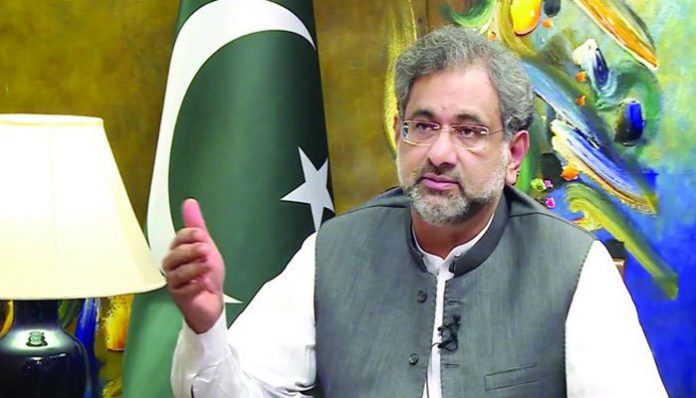KARACHI: The Overseas Investors Chamber of Commerce and Industry (OICCI) Managing Committee met Prime Minister Shahid Khaqan Abbasi and presented to him the results of the Perception and Investment Survey 2017 conducted in November 2017 among the leading 190 foreign investors who are members of OICCI.
The Principal Secretary to the PM Fawad Hasan Fawad, Commerce Secretary Younus Dagha, Special Assistant to the PM Ali J Siddiqui and BoI Secretary Samaira Nazir Siddiqui, were also present during the meeting.
The OICCI President Khalid Mansoor informed the prime minister “the overall results of the OICCI Perception and Investment Survey reflect improved and positive sentiments of the members of the OICCI, who are the leading foreign investors operating in the country.” OICCI president added, “75 per cent of the survey respondents have stated that they foresee continuing growth in their business and that they plan to make further investments in Pakistan.”
OICCI members, while appreciating the operating environment have also highlighted key concerns impeding fast growth of FDI in the country which include negative perception of the country against the positive reality, poor rating in the World Bank’s ease of doing business, issues with policy implementation especially on taxation, like the year on year continuation of 3-4 per cent super tax, long delays in settling tax refunds and growing number of interprovincial coordination issues which are manageable with good governance and frequent interaction among the key stakeholders.
Prime Minister Shahid Khaqan Abbasi commented, “OICCI Perception and Investment Survey 2017 results reflect highly positive sentiments which reconfirm the improving business confidence in the country. I compliment OICCI for coming out with this very timely collective independent assessment of the existing foreign investors. OICCI members have always been good ambassadors of Pakistan as they are not only doing good business in Pakistan but have also reposed high confidence in sharing the fast improving business environment and investment opportunities to potential foreign investors. The government of Pakistan is aware of some of the issues faced by OICCI members and will continue to engage regularly with OICCI and other leading economic stakeholders in ensuring that the investment and business in Pakistan flourish faster than any other country in the region.”
OICCI members who collectively pay about one-third of the total tax revenues collected in Pakistan and re-invest about $ 2 billion annually are positive about the opportunities and potential of the country and foresee expansion of the country’s economy. This is a welcome sign for all stakeholders, including the young people entering the job market, with nearly half of the OICCI Survey respondents indicating that they will add to their employment base. Moreover, nearly 66 per cent of the respondents indicated plans to make new investments, out of which nearly eight out of ten respondents plan to invest more or similar amounts over the next 1 to 5 years, as compared to the investments they made in the previous corresponding period. Moreover, the planned investment in business and human capital is expected to boost revenue and profitability, as 85 per cent of the respondents are expecting increased sales and 68 per cent expect their profits to rise.
About 80 per cent of the OICCI members have stated that they will recommend Pakistan to potential foreign investors. When comparing the business climate in Pakistan with that in ten regional countries, more than half the respondents gave a higher rating to Pakistan, as compared to India, Indonesia, Sri Lanka, Bangladesh, Philippines and Vietnam. Moreover, 71 per cent of the members’ regarded Pakistan as a “Medium Risk” country which is a vast improvement and a positive indicator for new investors.
A significant number of foreign investors has given good ratings for certain aspects of doing business like ‘access to local finance’, ‘safety of foreign investment’ and relatively favourable ratings for an ‘independent legal system’, and ‘protecting minority interest’, which reflect the liberal and investor-friendly policies appreciated by foreign investors.
Khalid Mansoor added that “a noteworthy change has taken place in respect of the top challenges faced by the OICCI members. ‘Energy Shortage’ identified as the second biggest challenge in the last three surveys has dropped out of the top five challenges, whilst ‘Security, Law and Order’ which topped the list in the last three surveys has been identified as the third biggest challenge this time.”
To further add to the optimism, recent accords signed by the government have all been rated high by the respondents. Majority of the respondents support the ‘CPEC’ projects, which most people believe will be a ‘Game Changer’ for Pakistan. Respondents also feel that Pakistan’s membership in the Shanghai Cooperation Organisation (SCO) will favourably impact the business environment in Pakistan. Half the respondents have shared positive views about Pakistan becoming a signatory of Organisation for Economic Co-operation and Development (OECD), as this agreement may lead to the broadening of the tax base in Pakistan, by compelling the citizens to declare offshore income and assets.
























